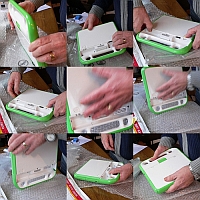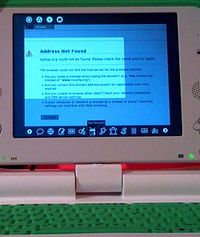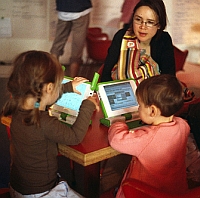This email from Mike C. Fletcher was original published on the OLPC Developers listserv and is republished here with Mike's permission as more OLPC News commentary on the WSJ article.
Obviously conflict sells stories best, so I won't attack the [Wall Street Journal] author for playing it up. That said, there were issues brought up that we should discuss rather than simply dismissing because the person bringing it up (in this case) had to sell a few papers. The best friend you have in a design project is the harshest critic available. As long as their critique is fair, we should listen carefully to it.
Much of the stuff I'm discussing below has already been started, or is under-way. I'm just suggesting that we keep it in mind a few things that the article points out...
It's not About the Hardware:

XO laptop hardware focus
The XO hardware is wonderful, but in the end, it's not the key thing. While it may be able to go into areas that another machine can't go, there are lots of areas that any machine can go into. We are an educational project, and while the screen makes a superlatively good textbook reader, the case is reasonably weather-resistant, and the battery life is good (but not yet so good that it's a killer feature), it is not true that every ministry of education will choose to go with "our" hardware.
Our hardware may have advantages, but it is just a (fairly generic) vehicle for accessing software, content and people, and if countries want to choose another project's hardware, more power to them.[As Nicholas has explicitly stated on a number of occasions.]
If we are serious in our goal of educating children, we need to do a few things, and some of this requires a readjustment and a detachment from the question of which hardware goes where. Does the hardware matter? Sure, there are areas where the XO is a better choice because of some metric, but if a country wants to choose Classmates or EEEs, that's fine, we still want to help educate those children.
Sure the segmentation of the market means that we can't hit the economies of scale we want, that sucks for us and means that our children will be getting less for their money. That sucks, and we'd like to get to the point of selling lots and lots of the XOs to make it as cheap and useful as possible, so we're going to continue to try to get more "sales".
By the time we're looking at a 'generation two' of the XO we would like to be able to order the hardware off-the-shelf to our spec and have companies produce dozens of different models. To make that happen we need to reach out to the hardware developers already working in this space and make shipping our software and content a no-brainer decision when they are selling into the educational market.
Addressing the Issue:
- We should port to the other inexpensive laptops, if a country decides to go with EEEs or Classmates, we should be in there offering an EEE or Classmate-optimised Sugar + Activities + Content that they can load onto those machines
- we should also port to the thin-client-style setups seen in e.g. Canonical's deployments of computing labs in the developing world
- we need to make use on multi-user machines easy, where Sugar is just a desktop manager session that is run just as one would run KDE or Gnome (so that computing lab situations can let children use Sugar's safe, rich without giving up the ability to run KDE/Gnome)
- we need to get our installation requirements on non-Fedora Linux down to a package-level installation
- (and have this be supported and maintained (preferably internally))
- (also very useful for encouraging developers)
We need to see ourselves, and communicate our vision of, being an educational project which is trying to grant access to children. Selling our particular hardware is useful because it has a few features that make it uniquely suited to many areas, but we need to expand our vision to achieve the goal IMO.
Standardisation and Application Availability:
We aren't shipping Windows. If countries want to use "the standard", our hardware likely isn't going to be chosen, and we likely cannot convince them to change (sure we can run Windows, but our hardware isn't a great choice for that). So for the countries whose goal is simply to enable their population to run Windows, well, they're basically lost, no need to worry about them.
For the other countries, we need to address their concerns. It seems that at least some of the concern is because we have introduced a huge barrier to entry for application porting. That means we have a pool of dozens of applications instead of hundreds or thousands of activities/applications. Even compared to other Linux-based solutions, we have a tiny pool of available applications, many of which are still in reasonably early stages of development.
We are missing whole classes of application/activity. We do not currently have usable vector or raster graphics, spreadsheet, generic IM or PIM clients, and countries are wondering when/if those are going to show up. With a "regular Linux" (or Windows) machine, a child can readily install an application that does those tasks and have it "simply work".
Sugar, by contrast, is being perceived as a "toy" environment. While that's good (we are a toy environment in the sense of an environment that helps one learn by playing), we need to address the pejorative of that view as well.
Addressing the Issue:
- we need some way for a regular, non-Sugar-fied application to be installed (easily) and run (with reasonable support) on a Sugar desktop. We should at least have the application-depth of a Linux desktop available to our students.
- Even if they don't integrate nicely and they have file dialogues instead of Journal dialogues (so you'll have to switch to the Journal and add the file manually)... practicality beats purity
- we need mechanisms that allow application developers to quickly package an existing application as an activity
- without a recompile (i.e. from an rpm or the like, just with some external metadata describing the activity's operation)
- with only a recompile to get basic Journal-triggering functionality (i.e. just substituting GTKFileDialogue with GTKJournalTriggeringFileDialogue)
- with just a few code changes (i.e. replacing menus with sugar-style tabbed toolbar-menus and the like)
Maintenance and Support:
One of the other quoted reasons is that countries are worried about ongoing support and maintenance. Far from being a "scary question", this should be seen as a strength. We need to make sure that people understand this as a strength and discuss it as such.
Addressing the Issue:
- we should be documenting the setup at the Galadima "Hospital"
- we should be documenting how the high-school students in Peru are maintaining the laptops there
- we should be turning these children's experiences into a manual for use by other schools and districts
Some country or project level maintenance needs to be part of the system, and we need to make sure that people are understanding that, and understanding the level of commitment required (including the need for a parts warehouse and a few techs to do more involved repairs). Again, the point is that this is not a product being sold, but a process that advances the country.
We need to make sure that the process is clear, straightforward and understood as part of the advantage of choosing open hardware. That said, even with the closed hardware, we want to encourage the countries to see themselves as part of the lifecycle of the educational technologies they are purchasing, and to demand access to maintain the machines themselves.
If you are a client nation for some technology, your resources are being drained. If you are a participant nation, your resources are being developed. The second and third tier support infrastructure needs to be modeled and documented too. Countries would like to see a manual that they can translate to give to their workers in their regional/country-level support centres.
Teacher Training:
Again, a quoted problem is teacher training concerns. Peru did an intensive program in the pilot programme where teachers were given one-on-three training by the deployment team. Uruguay AFAIK just handed the laptops out. Nepal has a teacher training programme under development AFAIK. Experience seems to suggest that the students are learning the machines reasonably quickly with other students leading the way, but that's no reason not to make materials available.
Addressing the Issue:
- We need to have the Teacher Training documented as it is done
- What was done
- What was covered o Where did teachers have problems
- How long did the training need
- Where were teachers starting from
- In effect, we need to collect together a model training curriculum for teachers that countries can use as a starting point
- yes I'm aware of the implications of cultural imperialism here, but again, we offer a model that can be adapted, used or rejected
Anyway, just don't want us to throw away a chance to improve ourselves... we are an education project and should take every opportunity that presents itself to learn.
This email from Mike C. Fletcher was original published on the OLPC Developers listserv and is republished here with Mike's permission as more OLPC News commentary on the WSJ article can be found here.





An excellent set of suggestions. I just want us to remember that oplc's lacks in these areas is not due to incompetence. Oplc is a very complex project that is simultaneously producing major innovations in hardware, software, and distribution. What has been accomplished in a couple of years is simply amazing.
I wonder if FSJ is right:
http://fakesteve.blogspot.com/2007/11/give-one-get-one-right-in-ass.html
FSJ is accurate, if not completely right in his assessment of the WSJ story. Negroponte did come off looking the fool, but I firmly believe that OLPC is still & will continue to be a strong influence...
IF the organization can be true to its focus on education, not hardware, as Mike points out in this post.
Wow what a great article! So many issues I would love to leave a note about. I agree 100% on making the sugar iunterface something more usable outside the xo.
But mainly on maintenance it´s important to switch the message "kids should fix their own damn computer" to "maintenance in this computer is so easy that some 17 old boy can learn. The pieces are so accessible that he can buy in any hardware store and make a small job out of doing it"
Excellent suggestions from Mike C. Fletcher. Couldn't agree more.
Great points Mike.
I am with Open Learning Exchange Nepal and we are helping the Government of Nepal implement its OLPC pilot. We are planning to do teacher training as you point out. We divide teacher training into 3 parts
1. Training them how to use computers
2. Train them on child-centered/constructionist teaching
3. How to use computers in a classroom for child-centered teaching
The pilot will be in April 2008. We should have the teacher training process ironed out and documented in Feb of next year. We'll post it to the OLPC wiki and our website www.olenepal.org around then.
I love Sugar but it needs to become more portable. We are doing all the learning activities for the Nepal's OLPC pilot using Squeak, particularly because of Squeak's portability and flexibility. We have few XO's right now and we need to show educators, kids, govt folks our activities. I would love to see Sugar become more portable so we could easily load it on more machines.
I consider the OLPC XO computer on a par with Marc Andreessen's Mosaic browser. Something that changed the world.
Even MS was unable to crush the free WWW completely. Although they really tried.
If you can make the XO even better, marvelous. But in the end, Sugar is free software. If you don't improve it, someone else will. But sooner is better.
Whatever errors the OLPC have made and will make, they already are a raving success. In science it is known that the better your paper is, the more comments you get. No-one will waste time correcting a bad paper, but everyone wants to be involved in a great paper.
This exact site is evidence of how great the OLPC is.
Winter
Having worked in the educational technology software sector for many years, most companies underestimate the need for support and users and the companies suffer as a result. The blood gets mopped up after the fact...
Now the trouble in this area is that you also have a much bigger training issue than I suspect OLPC is aware of. Teaching people to use computers is fairly straightforward - if time consuming and requiring lots of time for practice and follow-up. But there is no such thing as "Train them on child-centered/constructionist teaching". Yes, you are training teachers but you are also asking - if you're doing this on any scale in a country - to change its teaching system around to this way and to integrate this way of teaching across all their teaching. Otherwise go back in a year and you won't see these laptops in a classroom; they'll be in a cupboard, in the children's homes, but not in the classroom.
Just as Negroponte needs to recognize he's not a salesmen, he's a promoter or marketeer, and hire a proper sales head, he also needs to hire an organization to take over the teaching rollout. Best bet for the latter is to find a Faculty of Education at a university willing to do it. They have the skills and they have the added advantage of needing placements for their trainee teachers - voila the initial training team. Just need to find one with an international orientation.
It would be sad to see OLPC go the way of Netscape, but the MIT media lab was never known for successfully rolling out things in the real world. Time to get the people and organizations to do the things they know how to do, that the people at OLPC haven't actually done before.
And one more reason to do the first few country wide rollouts well and why you need a faculty of education to help - you need a full educational evaluation done of at least one implementation. OLPC needs to prove this program has significant educational benefit and to show that to other ministries of education in other countries.
John M
Great points made in the post and also in the comments. I agree that in order to succeed OLPC needs to focus on being an educational project. And in order to function as an educational (and not just a technological/laptop) project they have to focus on educational software and the implementation of this software.
I'm a student new media studies on the University of Amsterdam who wants to write his master thesis about the implementation of educational software in underdeveloped countries. I have a lot of sympathy for the OLPC project but (after travelling through western and middle Africa for a while)I'm a little bit skeptical about how these machines are being 'delivered'. In my opinion in order to really make a difference OLPC has to realize that children and their teachers need good (locally organized) guidence on how to use the machines.
After holding the XO at the first grassroots meating of OLPC Netherlands in Amsterdam last week I was pretty impressed by the little green machine but couldn't imagine an african kid figuring it out on it's own....Lot of work needs to be done in this field. In William Easterly's best-selling book 'the white man's burden' he states that for developmental work to be succesful organisations need to act as 'searchers'(buttoms-up, locally orientated) and not as 'planners'(top-down, big plans). In order to make a diference OLPC has to start acting like searchers, putting their efforts in making the project work in multiple small areas, creating a map/guidelines for future implementation.
OLPC will fail unless Execs at OLPC read what the history books have to say about successful hardware launches: "Its the user experience stupid". Without high-value software experiences, user interest will never grow strong and the OLPC effort will eventually atrophy and die. Read the book(s) on Atari, Nintendo, SEGA, Sony, and Microsoft's hardware wars. Its sad to watch the slow but inevitable failure of such a noble effort.